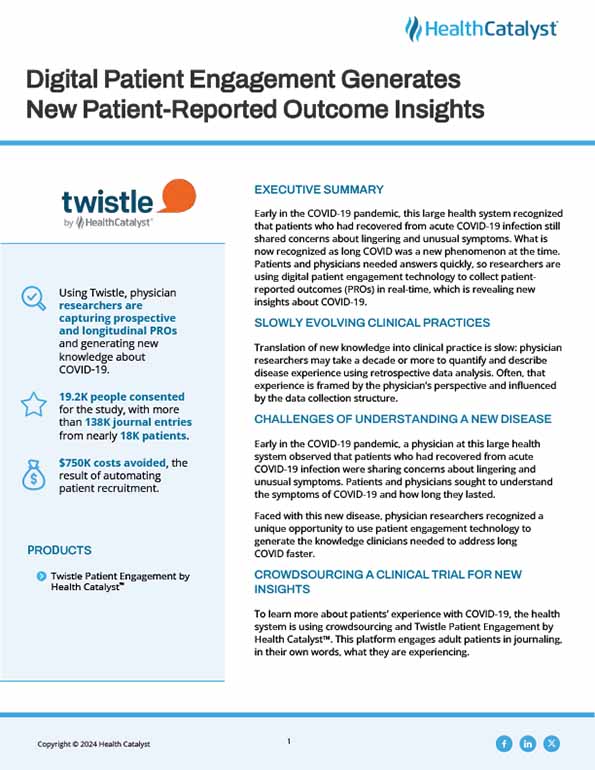Early in the COVID-19 pandemic, this large health system recognized that patients who had recovered from acute COVID-19 infection still shared concerns about lingering and unusual symptoms. What is now recognized as long COVID was a new phenomenon at the time. Patients and physicians needed answers quickly, so researchers are using digital patient engagement technology to collect patient-reported outcomes (PROs) in real-time, which is revealing new insights about COVID-19.
Translation of new knowledge into clinical practice is slow: physician researchers may take a decade or more to quantify and describe disease experience using retrospective data analysis. Often, that experience is framed by the physician’s perspective and influenced by the data collection structure.
Early in the COVID-19 pandemic, a physician at this large health system observed that patients who had recovered from acute COVID-19 infection were sharing concerns about lingering and unusual symptoms. Patients and physicians sought to understand the symptoms of COVID-19 and how long they lasted.
Faced with this new disease, physician researchers recognized a unique opportunity to use patient engagement technology to generate the knowledge clinicians needed to address long COVID faster.
To learn more about patients’ experience with COVID-19, the health system is using crowdsourcing and Twistle Patient Engagement by Health Catalyst™. This platform engages adult patients in journaling, in their own words, what they are experiencing.
Using secure Twistle text messages, physician researchers can rapidly recruit, consent, and enroll patients in the Institutional Review Board–approved clinical trial. Patients testing positive for COVID-19 receive an automated message from Twistle inviting them to participate in the clinical trial and become citizen scientists. Those who consent to the trial remain enrolled for one year, receiving automated text messages at defined intervals. Patients receive messages every other day for the first two weeks, once a week for the following three months, then once a month.
Twistle uses conversational English messages to ask symptom-specific questions and PRO Measurement Information System Global Health, capturing patient-reported data in these areas: physical health, physical functioning, general mental health, emotional distress, satisfaction with social activities and relationships, the ability to carry out usual social activities and roles, pain, and fatigue.
Patients submit responses to the messages via structured surveys and open-ended journal entries. Researchers then use natural language processes to analyze journal entries, creating a robust COVID-19 symptom timeline. Researchers are gaining new insights by leveraging the tool to capture crowdsourced data in real-time, and patients who participate in the clinical trial are provided the unique opportunity to contribute to the scientific process.
Using Twistle, physician researchers are capturing prospective and longitudinal patient-reported outcomes and generating new knowledge about patients’ experience with long COVID. The data provides a new understanding of how long COVID presents and helps improve the identification and care of these affected patients. By publishing previously unknown physical, mental, and social challenges and impairments, researchers are changing and improving clinical practices in a responsive way. Results include:
"Using Twistle, we can quickly engage patients in prospective, participatory research. In just a few months, we’ve gathered data and uncovered insights that typically require years to obtain, enabling us to gain a new understanding of patient-reported outcomes and disease progression."
- Physician Researcher
The organization continues to collect data from patients newly diagnosed with COVID-19. It is using Twistle in numerous ways, including presurgical patient education, patient-reported outcomes data for orthopedic and spinal surgeries, and medication education and adherence.




